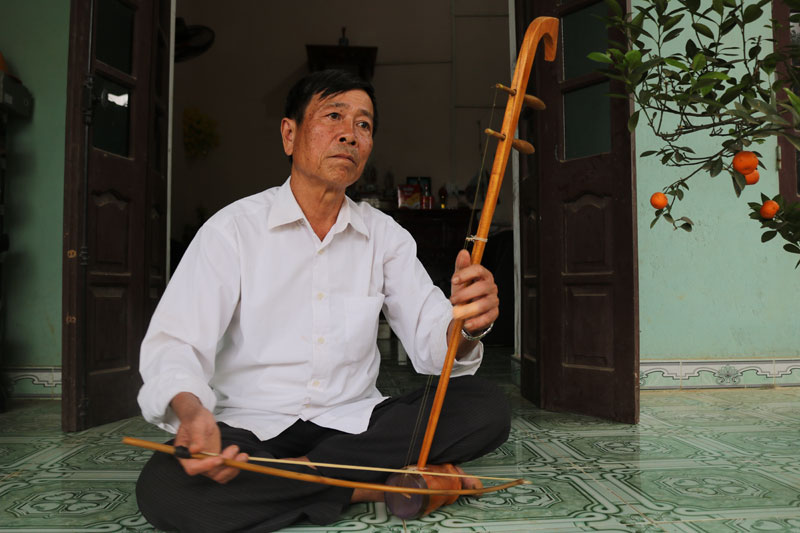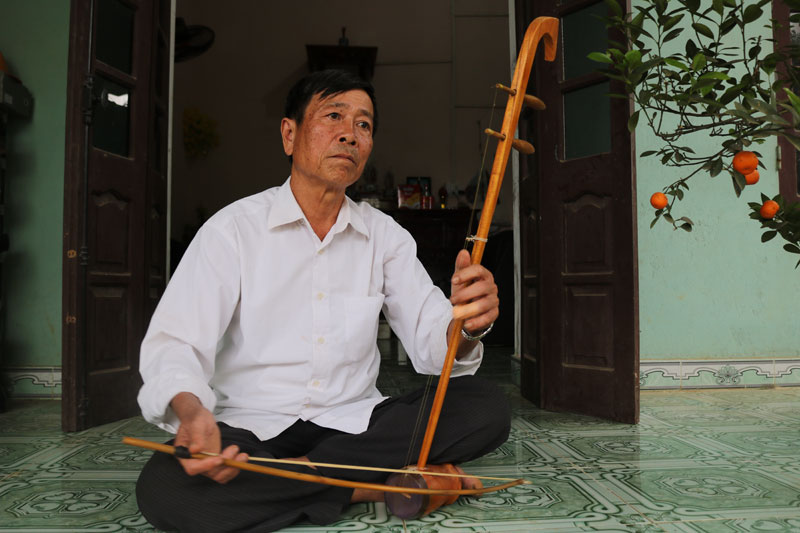
(HBO) - At the end of the winding road of the village is the home of Mr. Bui Van Eu, Lam village, Phong Phu commune, Tan Lac district. Having known about Doi singing at the age of 13, up to now, he is 67 years old and always trying to preserve the ancient cultural values of the Doi singing.

Mr. Bui Van Eu passionately practicing with
his favorite musical instrument.
Mr. Eu has known about Doi singing since he
was 13 years old; he knew how to play musical instrument at the age of 16. He
was very passionate about singing in his childhood. At first, he just liked
going to the theater and watching the singing performances. The more he watched
Doi singing, the more passionate and interested he became. Finally, he decided
to study singing from previous generations. Since then, he gained a better
understanding of the role of Doi singing in spiritual life and he had a desire
to store and preserve the integrity of its traditional cultural values.
At present, he continues to teach the younger
generations. His free ethnic musical instrument class includes nine people aged
from 20-40. These learners were all in the village, and he discovered their
musical talents. It was called as a class, but actually, only those who are
passionate focused on his house and he guides what he knows. The class had no
books and no lesson plans, all the rhythms and performances were recorded
deeply in his memory.
From the day he knew Doi singing, remembering
the most memorable memories, Mr. Eu exclaimed enthusiastically: "When I
was young, still single, I often participated in the Doi singing competition in
the village and commune. Once I sang in a competition with a girl in My Hoa for
3 nights with all the subjects required by the judges but could not defeated,
at last I got lost because she was extremely talented. When we started singing,
we were so far from each other.We sang until we got close to each other,
standing in front of each other, and then I found out that the girl hid a
notebook recording the lyrics at her back. For many years, I really want to see
her again for a Doi singing competition but unfortunately, she passed away.”
Mr. Eu
used to be the person who hit three gongs in the opening of Muong Bi Festival;
to be a judge at the Doi singing contests and the ethnic musical instrument
contest in the opening of the Festival; participating in culture and art of
ethnic minorities in the northern mountainous provinces and performing arts
exchange in the commune and district.
In the near future, he hopes to open singing
classes for the people in the village. These open-door classes welcome Doi
singing lovers and expect to learn about the ethnic music.
"I was discussing with the Commune
Farmers Association, I would like to open another class next month, I need to
teach the next generation what I know, if not, it might be faded by time. I
hope that Doi singing will attract more and more people to love and learn
especially young people. If we together protect and preserve, I believe we will
do, "- Mr. Eu said.
With an increasingly vibrant and widespread emulation movement aimed at building cultured residential areas and cultured families, Yen Thuy District has been making steady progress toward improving both the material and spiritual well-being of its people, while fostering a civilized, prosperous, beautiful, and progressive community.
Once lacking recreational spaces and community facilities, Residential Group 2 in Quynh Lam Ward (Hoa Binh City) has recently received attention for the construction of a new, spacious, and fully equipped cultural house. The project followed the model of state support combined with public contributions in both labor and funding.
The "All people unite to build cultural life" movement, which has been effectively integrated with Kim Boi district’s socio-economic development goals, is fostering a lively spirit of emulation across local residential areas, hamlets, villages, public agencies, and enterprises. In addition, through the initiative, traditional cultural values are being preserved and promoted, while community solidarity and mutual support in poverty reduction and economic development are being strengthened.
A working delegation of the Hoa Binh provincial People’s Committee led by its Permanent Vice Chairman Nguyen Van Toan on June 11 inspected the progress of a project to build the Mo Muong Cultural Heritage Conservation Space linked to tourism services in Hop Phong commune, Cao Phong district.
Born and growing in the heroic land of Muong Dong, Dinh Thi Kieu Dung, a resident in Bo town of Kim Boi district, in her childhood was nurtured by the sweet lullabies of her grandmother and mother. These melodies deeply imprinted on her soul, becoming an inseparable part of her love for her ethnic group's culture. For over 20 years, this love for her hometown has driven Dung to research, collect, and pass down the cultural values of the Muong people to future generations.
In the final days of May, the Ethnic Art Troupe of Hoa Binh Province organized performances to serve the people in remote, mountainous, and particularly disadvantaged areas within the province. These were not just ordinary artistic shows, but they were the meaningful journeys aimed at spreading cultural values, enhancing the spiritual life of the people and contributing to the preservation of ethnic minority cultural identities.



